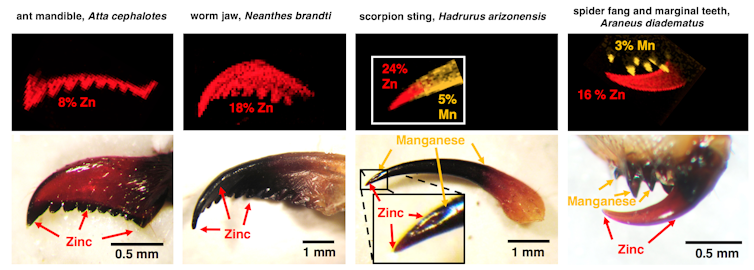Zinc-infused proteins are the secret that allows scorpions, spiders and ants to puncture tough skin
- Written by Robert Schofield, Research Professor in Physics, University of Oregon
The Research Brief[1] is a short take about interesting academic work.
The big idea
Many small animals grow their teeth, claws and other “tools” out of materials that are filled with zinc, bromine[2] and manganese, reaching up to 20% of the material’s weight. My colleagues and I call these “heavy element biomaterials,” and in a new paper[3], we suggest that these materials make it possible for animals to grow scalpel-sharp and precisely shaped tools that are resistant to breaking, deformation and wear.
Because of the small size of things like ant teeth, it has been hard for biologists to test how well the materials they are made of resist fractures, impacts and abrasions. My research group developed machines and methods to test these and other properties[4], and along with our collaborators, we studied their composition and molecular structure[5].
We examined ant mandible teeth and found that they are a smooth mix of proteins and zinc[6], with single zinc atoms attached to about a quarter of the amino acid units that make up the proteins forming the teeth. In contrast, calcified tools – like human teeth – are made of relatively large chunks of calcium minerals[7]. We think the lack of chunkiness in heavy element biomaterials makes them better than calcified materials at forming smooth, precisely shaped and extremely sharp tools.
To evaluate the advantages of heavy element biomaterials, we estimated the force, energy and muscle size required for cutting with tools made of different materials. Compared with other hard materials grown by these animals, the wear-resistant zinc material enables heavily used tools to puncture stiff substances using only one-fifth of the force. The estimated advantage is even greater relative to calcified materials that – since they can’t be nearly as sharp as heavy element biomaterials - can require more than 100 times as much force.
 Biomaterials that incorporate zinc (red) and manganese (orange) are located in the important cutting and piercing edges of ant mandibles, worm jaws and other ‘tools.’
Robert Schofield, CC BY-ND[8]
Biomaterials that incorporate zinc (red) and manganese (orange) are located in the important cutting and piercing edges of ant mandibles, worm jaws and other ‘tools.’
Robert Schofield, CC BY-ND[8]
Why it matters
It’s not surprising that materials that could make sharp tools would evolve in small animals. A tick and a wolf both need to puncture the same elk skin, but the wolf has vastly stronger muscles. The tick can make up for its tiny muscles by using sharper tools that focus force onto smaller regions[9].
But, like a sharp pencil tip, sharper tool tips break more easily[10]. The danger of fracture is made even worse by the tendency for small animals to extend their reach using long thin tools[11] – like those pictured above. And a chipped claw or tooth may be fatal for a small animal that doesn’t have the strength to cut with blunted tools.
But we found that heavy element biomaterials are also particularly hard and damage-resistant[12].
From an evolutionary perspective, these materials allow smaller animals to consume tougher foods. And the energy saved by using less force during cutting can be important for any animal. These advantages may explain the widespread use of heavy element biomaterials in nature[13] – most ants, many other insects, spiders and their relatives, marine worms, crustaceans and many other types of organisms use them.
What still isn’t known
While my team’s research has clarified the advantages of heavy element biomaterials, we still don’t know exactly how zinc and manganese harden and protect the tools.
One possibility is that a small fraction of the zinc, for example, forms bridges between proteins, and these cross-links stiffen the material – like crossbeams stiffen a building. We also think that when a fang bangs into something hard, these zinc cross-links may break first, absorbing energy to keep the fang itself from chipping.
We speculate that the abundance of extra zinc is a ready supply for healing the material by quickly reestablishing the broken zinc-histidine cross-links between proteins.
What’s next?
The potential that these materials are self-healing makes them even more interesting, and our team’s next step is to test this hypothesis. Eventually we may find that self-healing or other features of heavy element biomaterials could lead to improved materials for things like small medical devices.
[Over 110,000 readers rely on The Conversation’s newsletter to understand the world. Sign up today[14].]
References
- ^ Research Brief (theconversation.com)
- ^ bromine (doi.org)
- ^ new paper (www.nature.com)
- ^ developed machines and methods to test these and other properties (www.nature.com)
- ^ studied their composition and molecular structure (www.nature.com)
- ^ smooth mix of proteins and zinc (www.nature.com)
- ^ relatively large chunks of calcium minerals (darkwing.uoregon.edu)
- ^ CC BY-ND (creativecommons.org)
- ^ sharper tools that focus force onto smaller regions (doi.org)
- ^ sharper tool tips break more easily (doi.org)
- ^ extend their reach using long thin tools (doi.org)
- ^ hard and damage-resistant (www.nature.com)
- ^ the widespread use of heavy element biomaterials in nature (www.nature.com)
- ^ Sign up today (theconversation.com)

















